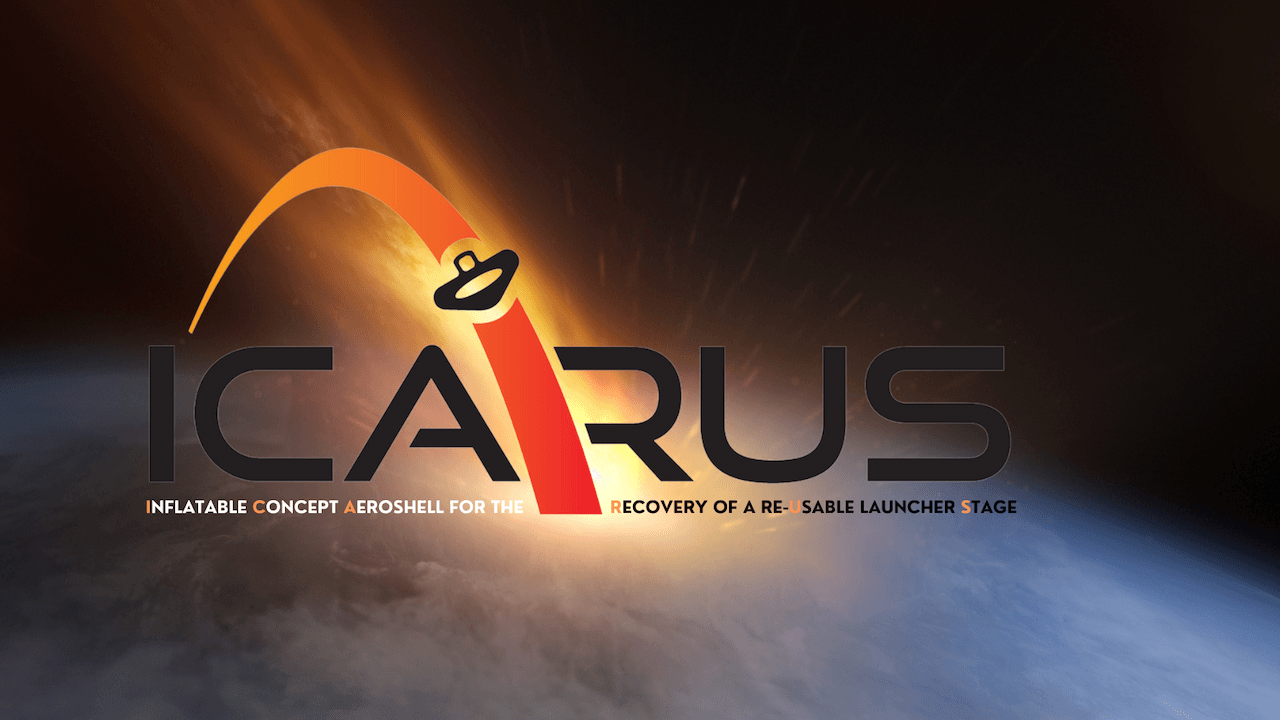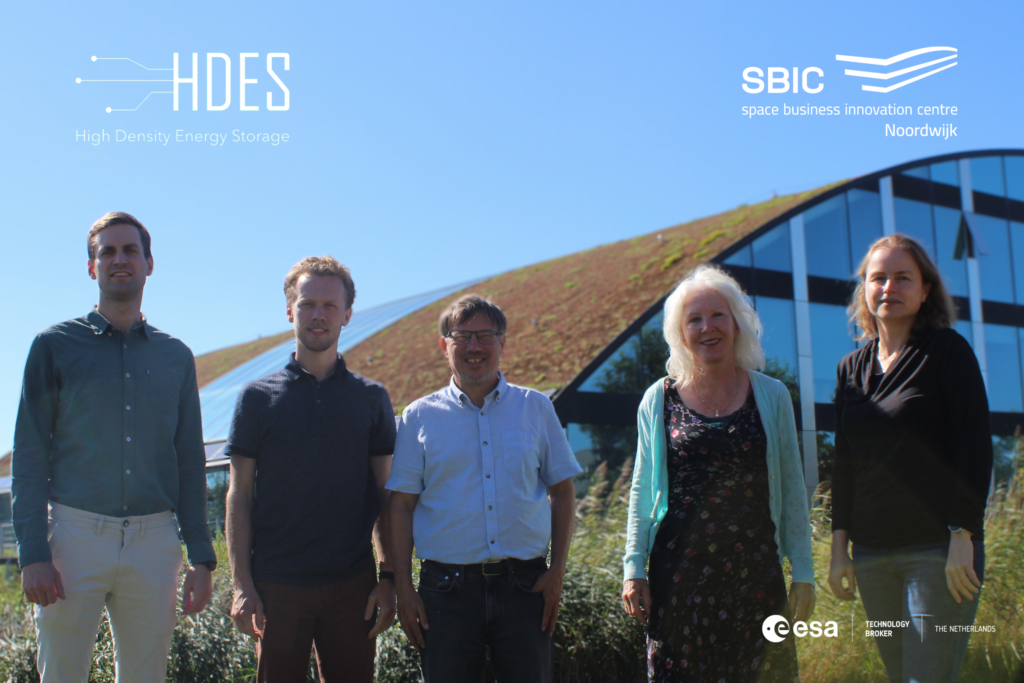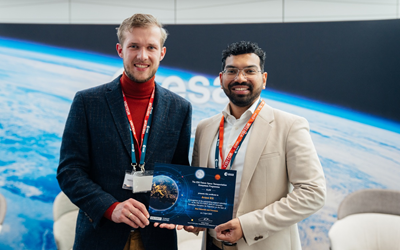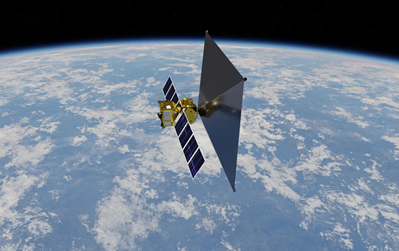Congratulations to ESA BIC alumnus HDES Service & Engineering for being selected as a consortium partner of ICARUS (“Inflatable Concept Aeroshell for the Recovery of a re-Usable launcher Stage”). This project aims to develop and demonstrate an inflatable re-entry system with a sounding rocket flight in 2028. HDES is one of the nine partners and responsible for the inflation system that will make use of large cool gas generators. Read on for the announcement from earlier this month in the press release issued by Deimos.
View news item on the Deimos website

A European consortium led by Elecnor Deimos is collaborating to demonstrate the feasibility of developing an inflatable heat shield (IHS) for recovering rocket stages from space. If successful, the system could also protect precious cargo during re-entry and descent to Earth and could eventually be used for Mars missions.
ICARUS has received 10 million euros worth of funding by the European Commission (EC) under the Horizon Europe programme (grant nr. 101134997) and is a follow-on project to EFESTO-1 (3 million euros) and to EFESTO-2 (2 million euros), funded by Horizon 2020 and Horizon Europe first-batch, respectively. ICARUS consists of three phases.
About ICARUS: The project group is made up of nine partners. It is led by Deimos (the technology branch of Elecnor) in Spain with participation of organisations located in France, Germany, Italy and the Netherlands.
One of the consortium partners is HDES, an ESA BIC alumnus; the team will be developing a large cool gas generator to be used for the inflation system of ICARUS – Read update on the HDES website
Project in three phases
The kick-off for the ICARUS project, estimated to take about 4 years in total, took place in early June 2024 and a demonstrator test date is envisaged for 2028. The project timeline is as follows:
- During the first phase, the consortium will complete the mission and system design along with on-the-ground maturation of key technologies.
- In the second phase, it will carry out a flight test on board a sounding rocket with a meaningful-scale demonstrator of an IHS in hypersonic conditions. When inside the rocket, the IHS demonstrator will have an approximate diameter of 50 cm and when inflated the shield will measure about 3-m diameter. Depending on the application, a commercial full scale version could have a diameter of 10-m diameter when inflated.
- The third phase consists of post-flight analysis of data and information collected during the mission: this will allow engineers to understand the behaviour of the spacecraft, to evaluate the performance of the technologies on board of it, and to verify the capabilities of the simulation models to predict both.
ICARUS signifies a great future contribution to space sustainability – with its potential to return launch vehicles and satellites elements safely to Earth
Experienced project partners
The consortium is led by Deimos playing the role of programmatic management and systems engineering and integration, and includes the following partners and affiliations:
- German Aerospace Centre (DLR-MORABA and DLR AS-HYP), responsible for flight test, launch campaign execution, and the vehicle’s health monitoring system
- Italian Aerospace Research Centre (CIRA), responsible for the vehicle’s thermal protection system
- French Aerospace Research Centre (ONERA), responsible the vehicle’s aeroshape definition and pre- and post-flight characterisation
- Pangaia Grado Zero (Italy), contributing to the development of innovative health monitoring sensors
- Politecnico di Torino (Italy), responsible for dissemination and communication
- Atmos Space Cargo (Germany), responsible for the inflatable structure
- HDES Service & Engineering (Netherlands), responsible for the inflation system
- Demcon Advanced Mechatronics (Netherlands), contributing to the development of innovative health monitoring sensors
Contributing to space sustainability
Simone Centuori, CEO of Deimos, said: “This is one of the most innovative projects of the decade encompassing a group of first-rate research organisations and companies. From EFESTO-1 to ICARUS, the development period is covering a total of 9 years and 15 million euros of funding. ICARUS is a key technological enabler for Europe, which will revolutionise European re-entry technologies, supporting applications like recovering rocket stages and hypersonic entry on Mars.
“ICARUS also signifies a great future contribution to space sustainability. With its potential to return launch vehicles and satellites elements safely to Earth, it can become a game changer to the launcher industry,” Centuori continues. “Collaborating with so many fantastic partners shows the power and potential of the European space landscape and the trust of all the partners in Deimos’s capability as project lead. This is a fantastic endeavour to use our expertise as a mission and system integrator to forge the various technologies and systems into a working product.”
About inflatable heat shields: Also known as inflatable atmospheric decelerators (IADs), these shields could be a fundamental new way to decelerate and protect various space systems during re-entry and descent. As a result, they could be ideal for the expansion of commercial space transportation technologies and services aiming to recover and reuse launcher stages and other space cargo. Integrating ad-hoc guidance, navigation and control (GNC) systems would further enhance these capabilities and allow the possibility of precision-landing applications on Earth and Mars.
Inflatable heat shields are deemed a game-changer due to intrinsic key features such as low re-entry ballistic coefficient, which can reduce mechanical and aerothermal loads during re-entry. While deployable capsules can be easily accommodated into the launch vehicles in a folded configuration and then deployed when needed. Due to this combination, they can be used to recover and potentially reuse segments of various space systems such as rocket stages. This makes them more sustainable and having less impact on the environment.
This is an edited (shortened) version of the news item on the Deimos website.
About HDES: High Density Energy Systems (HDES) Service & Engineering is a Dutch engineering and technology development company that designs, develops and manufactures cool gas generators for space, rescue and safety applications, and terrestrial projects. With headquarters in Noordwijk, HDES is an alumnus of the ESA Business Incubation Centre Noordwijk and a technical partner of SBIC Noordwijk providing technical support to current ESA BIC startups. hdes.nl

(Left to right: Sigurd Ravnan, Toby Sap, Berry Sanders, Els veenhoven, Armanda Hogedoorn)
HDES is both an alumnus of ESA BIC Noordwijk and technical partner of SBIC:
Related posts:


